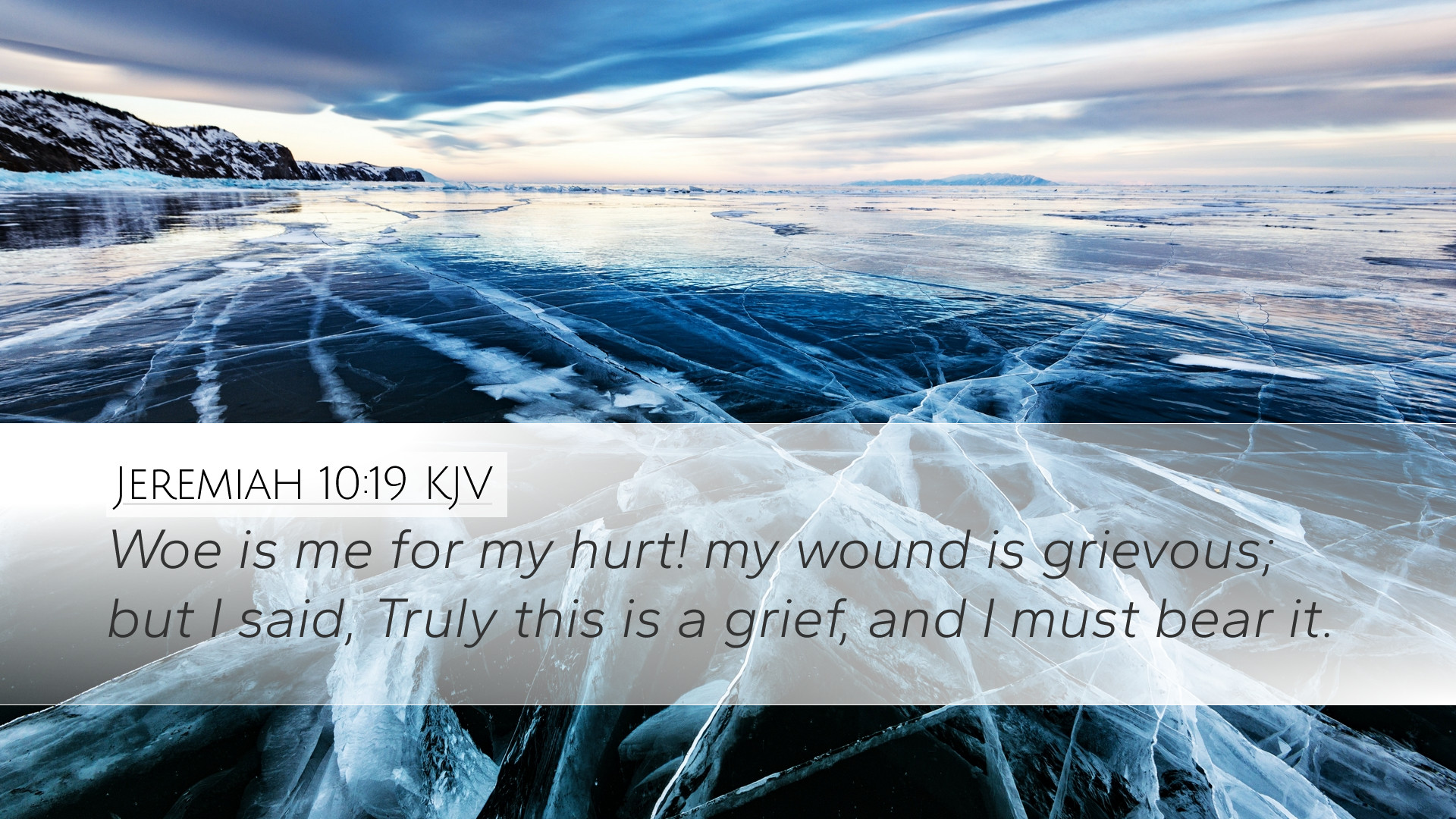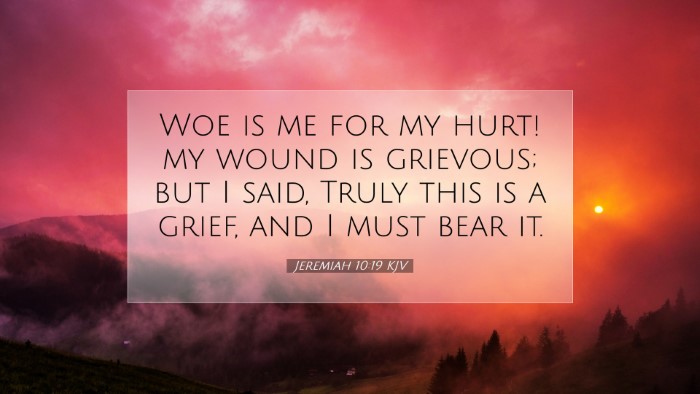Commentary on Jeremiah 10:19
Jeremiah 10:19 states: "Woe is me for my hurt! My wound is grievous: but I said, Truly this is a grief, and I must bear it." This poignant verse reflects the deep sorrow experienced by the prophet Jeremiah amidst the challenges faced by Israel. The emotional intensity of this text is underscored by several public domain commentaries, which provide a rich tapestry of theological insights and practical applications.
Contextual Background
Understanding the circumstances surrounding this verse is crucial. Jeremiah prophesied during a time of significant turmoil for Israel, as they faced impending doom due to their unfaithfulness to God. This backdrop of anguish and doom informs the emotional turbulence encapsulated within Jeremiah’s lament.
Insights from Matthew Henry
Matthew Henry reflects on this verse with a focus on human suffering and divine providence. He emphasizes that Jeremiah is expressing not only personal lament but also a collective grief for his nation. Henry states:
-
The Personal Aspect of Grief: Henry notes the gravity of Jeremiah's pain, highlighting that the prophet feels the weight of Israel's sin and judgment. The phrase "Woe is me" signifies an acute awareness of the dire situation facing God’s people.
-
Recognition of Divine Justice: Henry suggests that in Jeremiah's pain, there is an implicit acknowledgment of the righteousness of God's judgments. He sees the wound as a result of Israel’s grievous choices, underlining that divine justice must be accepted, even when it is difficult.
-
Endurance in Suffering: The latter part of the verse, "I must bear it," speaks to the necessity of perseverance. Henry interprets this as a call for faithful endurance in the face of communal suffering.
Insights from Albert Barnes
Albert Barnes provides a thorough exegesis of this verse, focusing on both its literary structure and its theological implications. He identifies several key themes:
-
The Depth of Pain: Barnes highlights the depth of the prophet’s sorrow, examining how it reflects the broader pain of a nation estranged from God. The phrasing "My wound is grievous" illustrates the profound nature of the prophet’s anguish.
-
Collective Grief: Barnes interprets Jeremiah's declaration of grief as a representation of the Israelites’ own experiences. This communal aspect underscores the idea that individual pain is often intertwined with collective disobedience and suffering.
-
Hope Amidst Despair: Despite the lament, Barnes suggests that there is an undertone of hope. Jeremiah's acknowledgment of the grief suggests a commitment to God’s will, hinting at eventual restoration, even as he expresses his present sorrow.
Insights from Adam Clarke
Adam Clarke provides a more theological examination of this passage, connecting it to the broader themes of prophecy and the character of God. His insights include:
-
The Prophetic Burden: Clarke emphasizes the burden borne by prophets like Jeremiah, who often suffer not only for their own sins but also for the sins of the people. He illustrates that this suffering is part of the prophetic vocation.
-
Recognition of Reality: He states that recognizing one's wounds and grievances is a crucial step towards healing. Jeremiah’s acknowledgment of his pain is, in itself, a form of lamentation that paves the way for genuine repentance and restoration.
-
The Call to Faithfulness: Clarke posits that this passage serves as a reminder of the need for faithfulness amidst trials. The prophet’s resignation to bear his grief teaches believers about the importance of faith in God’s overarching plan, even when immediate circumstances seem bleak.
Theological Implications
The implications of Jeremiah 10:19 are profound for modern readers, particularly for pastors, students, theologians, and Bible scholars. Key theological reflections include:
-
The Nature of Grief: This passage illustrates that grief is a legitimate and powerful emotion in the life of believers. Grieving one's circumstances or the state of the world is not only permissible but can lead to deeper faith and understanding.
-
Acceptance of Consequences: The prophet’s acceptance of his grievous state serves as a model for recognizing and accepting the consequences of sin, both personally and communally.
-
Pursuit of Restoration: Ultimately, the text encourages a pursuit of restoration and reconciliation with God, emphasizing that while the wound may be grievous, it is not fatal when viewed through the lens of God’s grace and mercy.
Conclusion
Jeremiah 10:19 encapsulates the heart of prophetic ministry—an intersection of deep personal pain and a collective awareness of spiritual infidelity. Through the insights of Matthew Henry, Albert Barnes, and Adam Clarke, we see that although the emotions of grief and despair are evident, there remains the enduring hope of restoration. For pastors and theologians, this verse serves as a powerful reminder of the importance of faithful lament in the Christian life, encouraging a robust engagement with both personal and communal sorrow while maintaining an unwavering trust in God’s redemptive purposes.


